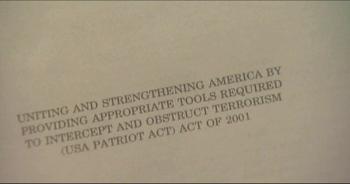Unconstitutional: The War on Our Civil Liberties


In the days after the 9/11 attacks, Congress overwhelmingly passed the Patriot Act, a piece of legislation that was supposed to make the United States safer against terrorists. What many people do not know is that at the very last minute, there were a number of changes made. The vote occurred so quickly after these changes that legislators did not have enough time to read (or more likely have their aides read and summarize for them) what they entailed, and now that they have had time to digest everything, many people are up in arms. The American Civil Liberties Union, who helped to produce Unconstitutional, sued the government claiming that the law was unconstitutional, and because of provisions in the law, is unable to disclose what they sued about.
Director Nonny de la Pena (Mama/M.A.M.A, The Jaundiced Eye) does a good job at literally ripping apart the Patriot Act. Yes, the ACLU helped fund this documentary, and appears prominently in some of the interviews, but nonetheless, this documentary raises many questions about the Act itself. Her biggest coup is interviewing Rep. Robert Barr. Barr was one of the more conservative members of Congress, and his presence and worries about aspects of the Patriot Act lend credence to de la Pena's worries. This is somebody on the opposite side of the political spectrum as many of people interviewed in this film, yet he has the same feelings about the Act.
The most emotional story is that of the Hamouis, a Syrian family that immigrated to Seattle. Under the Patriot Act, the government can arrest and detain somebody, and not allow them access to many of the rights due to criminals. They may be held with only vague charges, and can stay there indefinitely. The Hamouis owned a small grocery store and lived here for over a decade. Their youngest daughter was three when she left Syria, and for all intents and purposes, is 'American.' Still, after the FBI cleared them, they remained in jail for months, with little legal recourse. It is scary that the government can do this, but as de la Pena points out, they can do this and a lot more.
She asserts that many of the provisions in the Patriot Act have little to do with terrorism, and were just changes that various people wanted for a long time. Individual rights fell to the wayside as governmental powers increased. The government can now go to and demand customer records from bookstores, or checkout histories from libraries without providing a reason. This prompted some librarians to shred their records. The government can conduct sneak-peek searches, where they are not required to tell somebody that their house was searched. In other words, the victim may believe their house was robbed, when in actuality, it was the government's doing. There is little to no oversight on much of what the government can do, and the worst part is that most people have no idea what the Patriot Act supposedly does. The good news is that now that officials have had time to read and process it, there are a lot more voices in government now clamoring for some public debate.